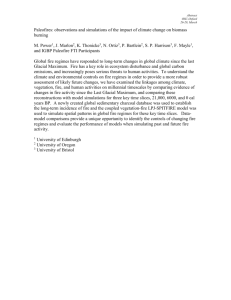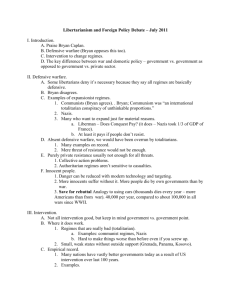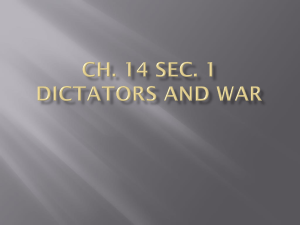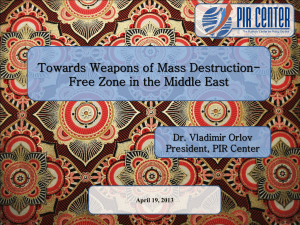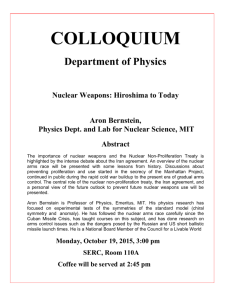old_Unit1StudyGuidePSC1010.F14
advertisement
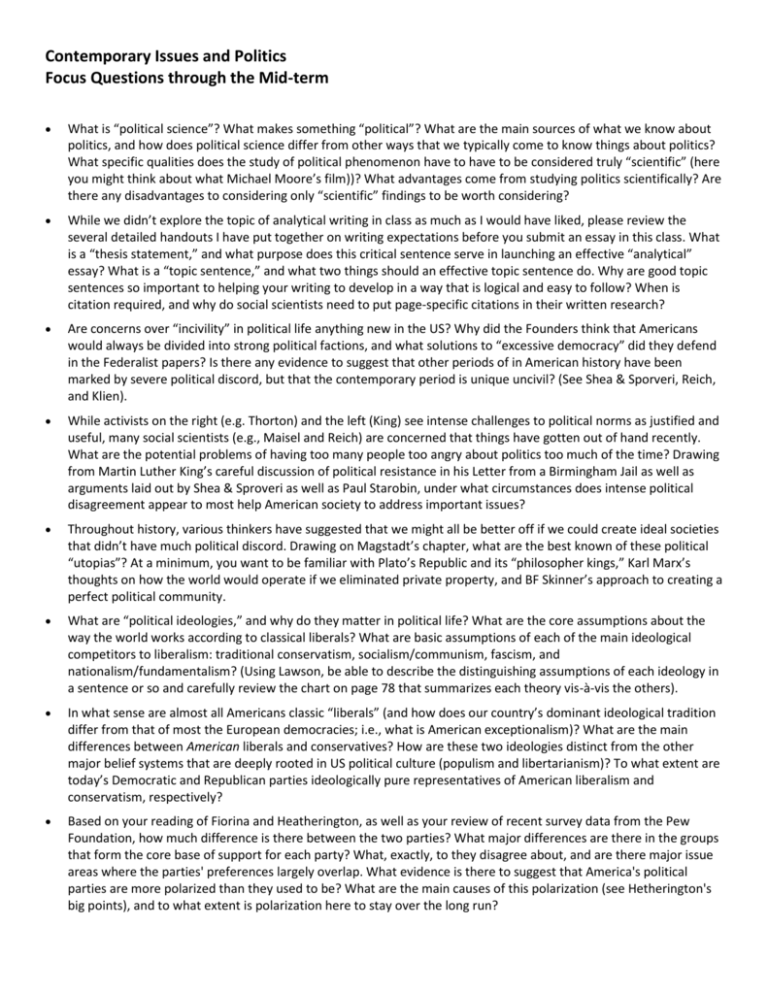
Contemporary Issues and Politics Focus Questions through the Mid-term What is “political science”? What makes something “political”? What are the main sources of what we know about politics, and how does political science differ from other ways that we typically come to know things about politics? What specific qualities does the study of political phenomenon have to have to be considered truly “scientific” (here you might think about what Michael Moore’s film))? What advantages come from studying politics scientifically? Are there any disadvantages to considering only “scientific” findings to be worth considering? While we didn’t explore the topic of analytical writing in class as much as I would have liked, please review the several detailed handouts I have put together on writing expectations before you submit an essay in this class. What is a “thesis statement,” and what purpose does this critical sentence serve in launching an effective “analytical” essay? What is a “topic sentence,” and what two things should an effective topic sentence do. Why are good topic sentences so important to helping your writing to develop in a way that is logical and easy to follow? When is citation required, and why do social scientists need to put page-specific citations in their written research? Are concerns over “incivility” in political life anything new in the US? Why did the Founders think that Americans would always be divided into strong political factions, and what solutions to “excessive democracy” did they defend in the Federalist papers? Is there any evidence to suggest that other periods of in American history have been marked by severe political discord, but that the contemporary period is unique uncivil? (See Shea & Sporveri, Reich, and Klien). While activists on the right (e.g. Thorton) and the left (King) see intense challenges to political norms as justified and useful, many social scientists (e.g., Maisel and Reich) are concerned that things have gotten out of hand recently. What are the potential problems of having too many people too angry about politics too much of the time? Drawing from Martin Luther King’s careful discussion of political resistance in his Letter from a Birmingham Jail as well as arguments laid out by Shea & Sproveri as well as Paul Starobin, under what circumstances does intense political disagreement appear to most help American society to address important issues? Throughout history, various thinkers have suggested that we might all be better off if we could create ideal societies that didn’t have much political discord. Drawing on Magstadt’s chapter, what are the best known of these political “utopias”? At a minimum, you want to be familiar with Plato’s Republic and its “philosopher kings,” Karl Marx’s thoughts on how the world would operate if we eliminated private property, and BF Skinner’s approach to creating a perfect political community. What are “political ideologies,” and why do they matter in political life? What are the core assumptions about the way the world works according to classical liberals? What are basic assumptions of each of the main ideological competitors to liberalism: traditional conservatism, socialism/communism, fascism, and nationalism/fundamentalism? (Using Lawson, be able to describe the distinguishing assumptions of each ideology in a sentence or so and carefully review the chart on page 78 that summarizes each theory vis-à-vis the others). In what sense are almost all Americans classic “liberals” (and how does our country’s dominant ideological tradition differ from that of most the European democracies; i.e., what is American exceptionalism)? What are the main differences between American liberals and conservatives? How are these two ideologies distinct from the other major belief systems that are deeply rooted in US political culture (populism and libertarianism)? To what extent are today’s Democratic and Republican parties ideologically pure representatives of American liberalism and conservatism, respectively? Based on your reading of Fiorina and Heatherington, as well as your review of recent survey data from the Pew Foundation, how much difference is there between the two parties? What major differences are there in the groups that form the core base of support for each party? What, exactly, to they disagree about, and are there major issue areas where the parties' preferences largely overlap. What evidence is there to suggest that America's political parties are more polarized than they used to be? What are the main causes of this polarization (see Hetherington's big points), and to what extent is polarization here to stay over the long run? What are the major tradeoffs that a democracy like the US has to make when making the big institutional choices about how to structure its government? What are the main institutional features of America's democracy and how distinct are they when compared to the governmental, electoral, and party systems found in other advanced democracies? What are the main shortcomings of America’s 200-plus year old national political system? Why is it so hard to get legislation through Congress? How and why is it possible for certain, relatively small interests to block the will of the political majority in the US? What are the limitations of having just two major political parties? What are some of the main proposals out there for fixing the structural problems in the American political system (for example, adoption a parliamentary system that uses proportional-representation elections), and what would be required to introduce those changes into the US Constitution? What is the difference between "states," "nations," and "nation states"? Why and when did modern "states" develop? How important were specific transportation, communication, and weaponry applications to the rise of the state, and why did it displace most other forms of social organization? Why and how did they become the most important political actor in contemporary international politics? How and why did states come to be considered "sovereign" actors? What exactly is sovereignty and what role does this concept play in how states interact with one another in the world today? How is globalization impacting this role? Why are the world's most powerful international organizations useful? What are the most important international organizations in the world today and why do Brooks and Wohlforth think that they are outdated? Is there any evidence to suggest that international organizations are replacing the state as the primary actor in international politics or the role that the US has played in recent decades? What exactly is "globalization," what has caused it, and what are its major dimensions (i.e., is this all about economics?)? Why do some analysts believe that globalization is going to make national governments much less important in the future than they have been for the last several hundred years? Is there any evidence to suggest that the role of states is being displaced by international organizations or the pressures of globalization? Some scholars argue that globalization is hardly inevitable and that we should consider integrations downsides; what are some of the costs they cite, especially with respect to trade and the developing world? What evidence does Martin Wolf present to suggest that globalization has considerable upsides? What are the major threats to continued globalization over the long run? Comparing our standing on various indicators, how well prepared is the United States to deal with the pressures of globalization? Are we going to be the--or at least a--dominant player in global politics as the 21st century unfolds? What advice does Fareed Zakaria believe we should take from the decline of Britain to guide our major policy and economic steps going forward? Why does he believe that our political system, rather than the economic prosperity of other rising powers, is probably the main threat to American hegemony over the long-run. Why do both Zakaria and Anne-Marie Slaughter believe that the US is uniquely positioned to benefit from globalization when compared to Europe or the rising powers? What advantages may our immigration inflows, geography, demographics, and especially our entrepreneurial culture give us in a world that is more economically, politically, socially, and legally integrated? What distinguishes democratic regimes from non-democratic ones? What (and where) are some of the major types of non-democratic regimes in the world today? What is the difference between an autocracy, and oligarchy, and a democracy? Thinking about class discussion and your earlier reading in the semester on utopias, how much sense does it make to say that having lots of people involved in making the most important decisions of government is always a good thing? In class, we will talk about the various ways that a person can think about good, effective government. What benefits to citizens are democracies uniquely suited to deliver? Are there any situations in which non- democratic governments may have some appeal? Why are nondemocratic regimes sometimes very popular and even more so than their democratic counterparts? Why does Andreas Schedler think that hybrid regimes ("electoral authoritarians") have emerged as the main alternative to democracy, and why does he think that such regimes will probably constitute the "last line of defense" for authoritarianism over the long run? Thinking about the overlap in the major political and social institutions that are typically found in democracies and these hybrid regimes, what makes some governments deeply democratic while others states that have seemingly similar constitutions are undemocratic? To what extent does H.E. Chehabi's article on post-revolutionary Iran conform to Schedler's description of the "menus" that modern authoritarian states rely on to secure obedience from citizens? What are the defining qualities (the "essence") of totalitarian regimes, and how are they different from both democracies and authoritarian regimes? How is day-to-day politics different under totalitarian, authoritarian, and democratic leaders? What are some of the main variants of totalitarian regimes (e.g., communist, theocratic, etc.)? What were the major examples of totalitarian rule in the 20th century? Are there any examples of totalitarian regimes in more recent decades? Why are electoral authoritarian regimes more common than totalitarian regimes? What type of politics is likely to lead to a totalitarian regime? Why do everyday people initially support them? What does political life look like in the early stages of the typical totalitarian regime? What type of ideologies to totalitarian regimes espouse? How are these ideologies different than what you would find in a democratic or authoritarian society? Drawing ideas from Magstadt, what is the process by which most totalitarian regimes become "institutionalized"? Are there any similarities in the "transformation of society" when you compare the leading examples of totalitarian regimes in the 20th centry? In what sense was post-revolutionary Iran a totalitarian state, and why does Chehabi conclude that totalitarianism was "stillborn" (by this he means that certain features of Iranian society and especially the Islamic clergy prevented full totalitarianism from ever taking root)? How did authoritarianism institutionalize in post-revolutionary Iran, and is there any evidence to suggest that it has developed in a way that leaves open any possibility for democracy in the future? What obligations does Iran hold as a signatory of the nuclear non-proliferation treaty (the NPT)? What obligations does the US have under that treaty? What evidence, if any, suggests that neither of these countries is honoring its treaty commitments? Why does only one side face sanctions? How many nuclear weapons have the US and other legally recognized nuclear powers developed over the last several decades? How many to do we have today? How many does Iran have, and where it in the weapons development process? What other countries that aren't' supposed to develop nuclear weapons have tried to so? Have any of them succeeded? Has any country ever given its nuclear weapons up? Thinking about the nature of the Iranian political regime, Iran’s specific leadership, and the balance of power in the Middle-East, are there any unique concerns with Iran developing nuclear weapons that also don't apply to the many countries that already have them, including us, Russia, China, Pakistan, and Israel? What would be the most likely consequences of Iran acquiring nuclear weapons? How do states with these weapons act relative to other states? Why does Kenneth Waltz—a major political science analyst—think that the US and Europe should not stand in Iran’s way if it want to develop nuclear weapons. What are the options to prevent Iran from getting nuclear weapons, how likely are these to succeed, and what expected or potential costs do they have? Is there any reason to think that the world might be better or worse off if the efforts to keep Iran from acquiring nuclear weapons was addressed in a framework seeking to globally—or at least regionally—ban these weapons?
